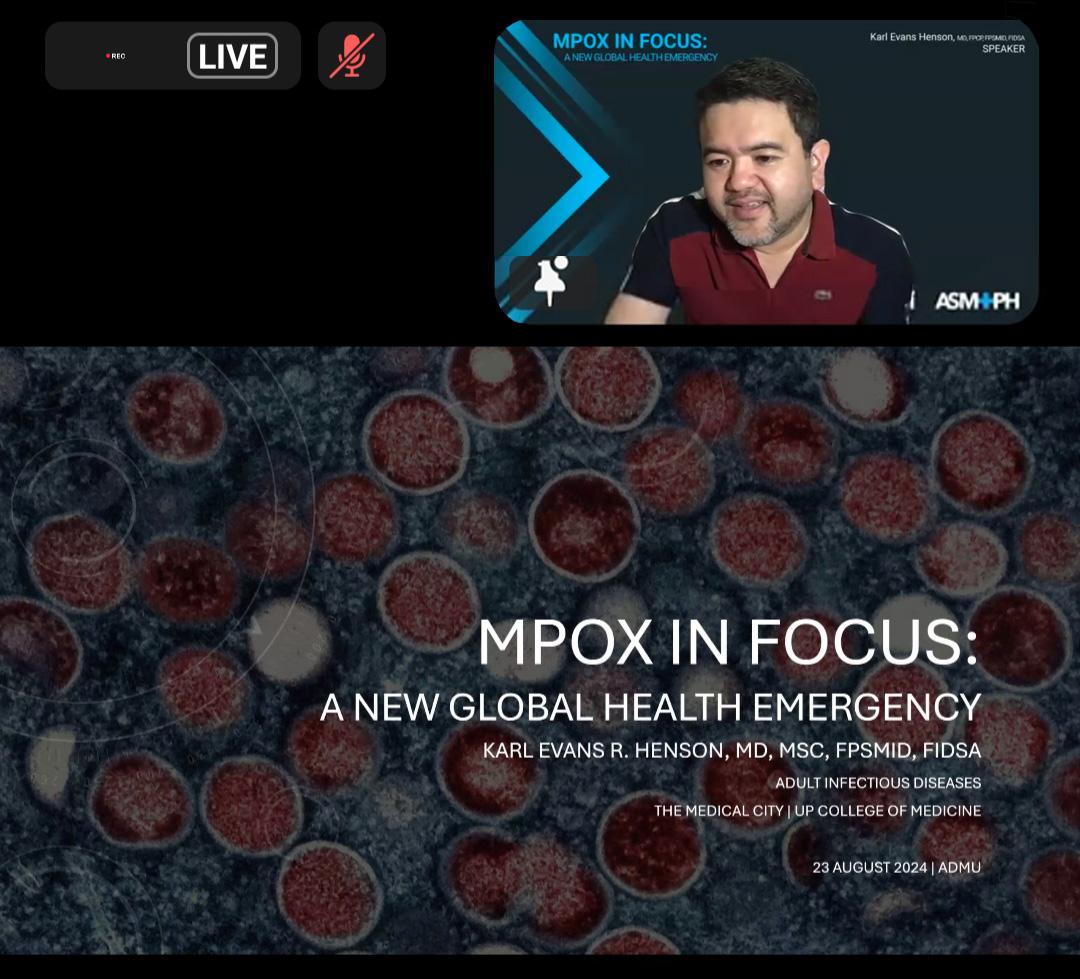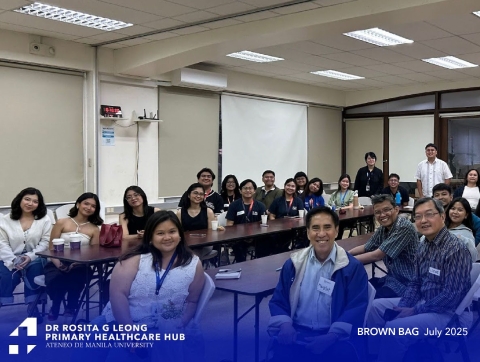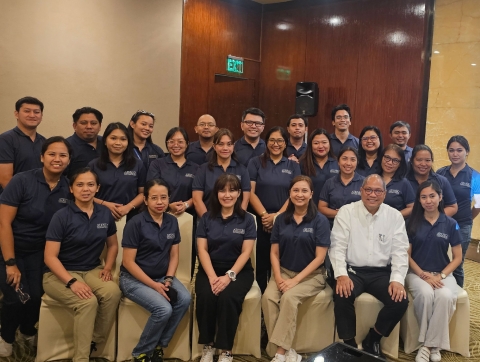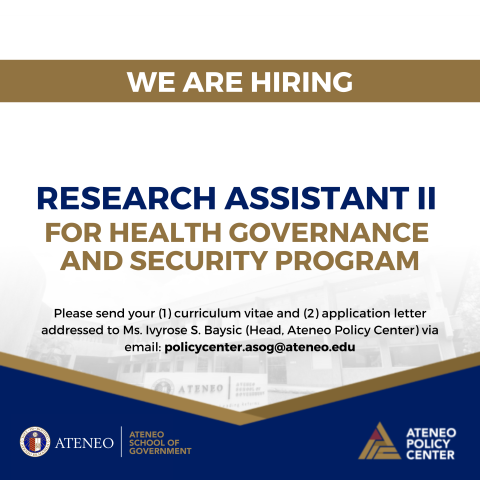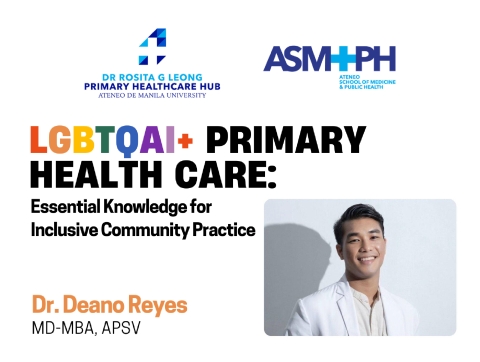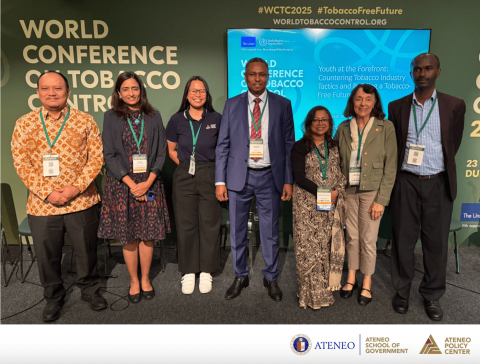Mpox in Focus: A New Global Health Emergency (A Webinar by ASMPH and the OAVP for Health, Care, and Well-Being)
04 Sep 2024
In light of the Philippines recording its first case of Mpox, ASMPH, in collaboration with the OAVP for Health, Care, and Well-Being, held a crucial webinar on 23 August titled "Mpox in Focus: A New Global Health Emergency." This webinar aimed to raise awareness and educate the public on this emerging global health threat.
The webinar began with an invocation led by Dr Ray Baquiran, Associate Dean of ASMPH, setting a reflective tone for the event. Following the prayer, Dr Cenon "Dodie" Alfonso, Dean of ASMPH, delivered the opening remarks and introduced the esteemed speaker, Dr Karl Evans Henson, a specialist in Internal Medicine and Infectious Disease and a respected member of the ASMPH faculty. The webinar was facilitated by Dr Gelo Apostol of ACRI, who also fielded a few questions after the discussion.
As Mpox has been declared a global health emergency, the urgency to understand and combat the disease cannot be overstated. Dr Henson provided an in-depth overview of the latest developments, prevention strategies, and practical steps to protect both individuals and communities.
Understanding Mpox
Mpox, formerly known as Monkeypox, is caused by the Monkeypox virus (Mpxv). Dr Henson explained that while the virus is endemic in parts of Africa, recent outbreaks have spread globally, including to the Philippines. The disease primarily presents as generalized skin lesions and can be transmitted through close contact, especially skin-to-skin contact. Sexual contact was noted as a significant mode of transmission during the 2022 outbreak.
Dr Henson also highlighted the three phases of Mpox infection: the incubation period, prodrome phase (which may or may not be present), and the rash phase. The incubation period ranges from 5 to 21 days, during which individuals are not symptomatic and not contagious. However, once symptoms like fever, malaise, and rash appear, the person becomes contagious.
Transmission and Prevention
The primary mode of Mpox transmission is through close contact with an infected individual, including sexual contact. Dr Henson emphasized that while Mpox is not as easily transmissible as COVID-19, it still requires serious attention. He urged the public to take preventive measures, such as avoiding close contact with symptomatic individuals, wearing personal protective equipment (PPE) if necessary, and practicing good hygiene.
A Balanced Perspective
Dr Henson assured attendees that while Mpox is a global health concern, it is not as transmissible as airborne viruses like COVID-19. He emphasized the importance of approaching the situation with calm and informed action rather than fear. He also pointed out that the fatality rate of Mpox is much lower than that of COVID-19, and the healthcare system is unlikely to be overwhelmed by Mpox cases.
Reducing Stigma
Addressing potential stigmatization, Dr Henson clarified that Mpox is not classified as a sexually transmitted disease (STD), despite its transmission through sexual contact in certain populations. He emphasized the need for accurate information to reduce stigma and ensure that everyone understands the full scope of Mpox transmission.
Practical Guidance
For those who suspect they may have Mpox, Dr Henson advised seeing a doctor immediately for proper diagnosis and testing. He highlighted the role of healthcare professionals in managing the disease and facilitating necessary referrals.
Dr Henson concluded the main discussion by reiterating the importance of reliable information, preventive measures, and community support in managing the Mpox outbreak. He encouraged everyone to stay informed, practice safe behaviors, and seek medical attention if needed.
Closing Remarks and University Response
The webinar concluded with closing remarks from Dr Sio Marquez, who provided insights into the university's response to the emerging Mpox threat. He outlined the measures being taken by the university to ensure the safety and well-being of the community, emphasizing the institution's commitment to proactive health education and public safety.
As Mpox continues to spread worldwide, staying informed and taking proactive measures is crucial. ASMPH and the OAVP for Health, Care, and Well-Being are committed to providing ongoing education and support to help the public navigate this new global health challenge.

